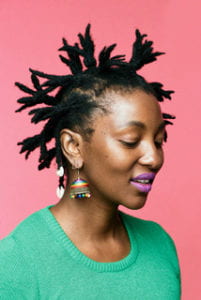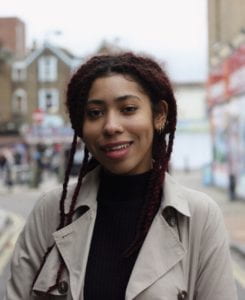Rambisayi and Nicole who are currently working with Emma Tarlo and Adom Philogene Heron over the summer period as part of GRIP: Research Internships. We caught up with Rambisayi and Nicole to find out more about what they will be working on over the coming weeks.
 Rambisayi, BA Anthropology and Visual Practice
Rambisayi, BA Anthropology and Visual Practice
This summer I have been given the opportunity to intern for Professor Emma Tarlo on a project titled Hair Biographies: How do we relate to the fibre that grows from our heads. This project focuses on people’s relationships to their hair. As an intern I will be employing ethnographic methods including photography, voice recordings and writing to compile a unique collection of personal hair stories. This is a very exciting opportunity for me as I get to be mentored by Professor Emma Tarlo whose work on material culture has inspired me throughout my undergraduate studies. As the project is in collaboration with, and is a part of a larger exhibition commissioned by the Horniman Museum I also get to be mentored by Dr Sarah Bryne, deputy keeper of anthropology at the Horniman Museum. The final output will be a short film that will possibly be shown at a larger exhibition commissioned to Prof. Emma Tarlo by the museum for exhibition in 2021.
 Nicole, BA Anthropology and Visual Practice
Nicole, BA Anthropology and Visual Practice
I will be working on the GRIP internship within the Anthropology department this summer, titled Anthropology and ‘Decoloniality’ with Dr.Adom Philogene Heron and Dr. Gabriel Dattatreyan. The final research project will be presented in the form of a website. The aim of the site is to host a dialogue about decolonization and its relationship to anthropology as a discipline, articulating efforts to decenter the anthropological canon by questioning established forms of knowledge production and what is considered legitimate within the academic space, including the medium that conveys information itself. Thus, there will be range of ways to channel and challenge ethnographic ideas through alternative forms to conventional academic text (and language), such as photography, film, audio recordings, etc. I am delighted to be part of this project and the ongoing discussion of decolonization in pedagogy, much of what has emerged from recent decentering meetings at Goldsmiths, as well as Goldsmiths Anti-Racist Action group. I am looking forward to interviewing participants, reflecting on my conversations with them, and situating their perspective on a digital space for others to engage with.